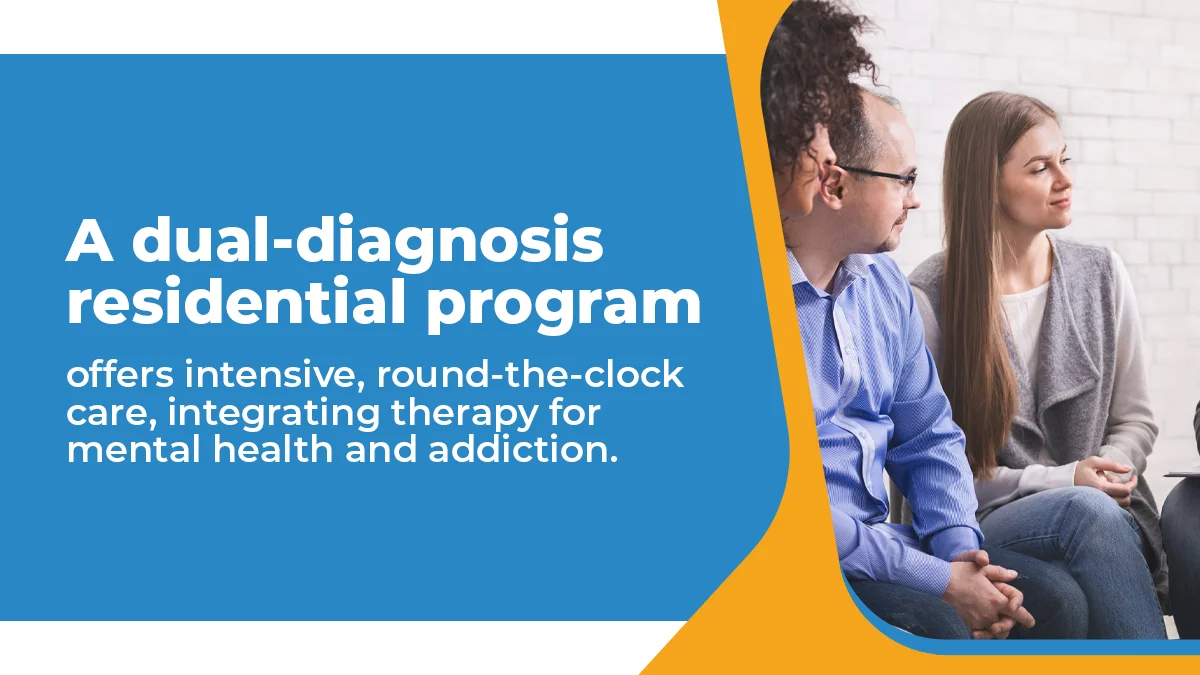
Using Tramadol To Manage Suboxone Withdrawal
Explore the role of tramadol in managing suboxone withdrawal symptoms with The Recovery Team-Newton.

Dual diagnosis refers to the co-occurrence of mental health and substance use disorders. Treating both issues simultaneously is vital for recovery. People with dual diagnosis need specialized care to address both their mental health and addiction problems effectively.
A dual-diagnosis residential treatment program offers comprehensive care in a live-in setting. Explore the benefits and treatment options these programs provide. Understand how this integrated approach can support lasting recovery and well-being.
Dual diagnosis needs to manage mental health and addiction concurrently through integrated treatment approaches. Here’s what you need to know:
The Recovery Team-Newton offers a wide range of services to treat dual diagnosis. Call us at (508) 978-2772 to learn more about our services.
Dual diagnosis means having a mental health disorder and a substance use disorder simultaneously. It complicates treatment because each condition affects the other. For example, anxiety disorder might lead someone to misuse alcohol, and alcohol misuse might worsen anxiety. Recognizing and treating both conditions is crucial for adequate recovery.
Treatment for dual diagnosis requires a comprehensive approach. Professionals create integrated plans that address both mental health and substance use. Therapy, medication, and support groups often work together. This coordinated care helps individuals manage symptoms and reduce the risk of relapse.
Living with a dual diagnosis can be challenging, but support is available. Friends, family members, and healthcare providers play vital roles in recovery. Encouragement and understanding from loved ones make a significant difference. Accessing the right resources and maintaining a supportive network is essential for managing both conditions effectively.
A dual-diagnosis residential program helps people with both mental health and substance abuse issues. These programs offer 24/7 comprehensive care in a structured environment. Patients live at the facility during treatment. This setting provides intensive support and therapy to address both conditions simultaneously.
Dual-diagnosis residential programs treat co-occurring mental health problems and substance abuse disorders. They provide a safe, structured environment for recovery. These programs use a combination of therapies and support. The goal is to help patients manage both their mental health issues and substance use effectively.
Residential programs need patients to live at the treatment center, allowing continuous support and supervision. Outpatient programs let patients live at home while attending therapy sessions. Residential care is more intensive and offers higher support and structure.
Key components include individual therapy, group sessions, and medical care. Patients receive personalized treatment plans to address their specific needs. Programs also offer life skills training and relapse prevention. This comprehensive approach helps individuals build a strong foundation for lasting recovery.
Dual-diagnosis residential programs help people with mental health conditions and drug addiction issues. These programs offer a safe place to live while receiving treatment. They combine various therapies to address both situations. This holistic approach ensures better long-term recovery and improved overall well-being.
Comprehensive treatment options involve addressing all aspects of a person’s health. These programs provide medical, psychological, and emotional support. Patients receive individualized care plans tailored to their needs. This thorough approach ensures that every part of their health is noticed.
Integrated care means combining treatments for mental health and addiction. This approach ensures that patients receive consistent and proper care. Doctors and therapists collaborate to provide a unified treatment plan, which helps improve patient outcomes and recovery success.
24/7 support and supervision provide constant care and monitoring. Staff members are always available to help patients. This round-the-clock support ensures safety and immediate response to any issues. It helps create a secure environment for recovery.
Structure and routine are vital in residential programs. Patients follow a daily schedule with set activities and therapies. This regularity helps them build healthy habits and reduce anxiety. A structured environment supports steady progress and stability in recovery.
The assessment and admission process for dual diagnosis programs evaluates individuals with mental health and substance abuse issues. This process includes an initial evaluation, meeting specific admission criteria, and creating personalized treatment plans. Each step ensures that patients receive the most effective and tailored care possible.
The initial evaluation involves meeting the patient to understand their mental health and addiction issues. Medical professionals conduct interviews and assessments to gather necessary information. They may ask about medical history and current symptoms. This helps to form a clear picture of the patient’s condition.
Criteria for admission ensure that the patient needs dual diagnosis treatment. Professionals look for signs of both mental disorders and substance abuse problems. They consider the severity of these issues. Patients must meet specific requirements to benefit from specialized treatment programs.
Personalized treatment plans are created based on the patient’s unique needs. These plans combine therapies for mental health concerns and addiction. Professionals tailor the treatment to address specific symptoms and unique challenges, increasing the chances of successful recovery and long-term well-being.
In dual-diagnosis residential programs, addressing both mental illness and substance use disorders is crucial for effective treatment. Various modalities, such as Cognitive Behavioral Therapy (CBT), Dialectical Behavior Therapy (DBT), Medication-Assisted Treatment (MAT), and holistic approaches, cater to individual needs, promoting recovery goals and addressing co-occurring conditions comprehensively.
CBT helps dual-diagnosis clients by addressing negative thoughts and behaviors. It teaches them to identify and change harmful patterns. Group therapy and individual counseling focus on managing mental illnesses like bipolar disorder and post-traumatic stress disorder. This evidence-based therapy promotes healthy coping mechanisms and supports recovery goals.
DBT is effective for clients with intense moods and co-occurring disorders. It combines individual counseling and group therapy to teach emotional regulation. Clients learn skills to manage stress and improve relationships. This approach is beneficial for those with mental illness, promoting stability and recovery.
Medication-assisted treatment combines prescription medications with behavioral therapies to treat dual-diagnosis clients. It helps manage mental illness and substance use disorders. Medication management addresses symptoms and reduces cravings. This approach, often used for bipolar disorder and others, supports recovery goals by stabilizing moods and improving overall health.
Holistic approaches treat the whole person, not just symptoms. They include therapies like yoga, meditation, and nutritional counseling. These methods address the root causes of co-occurring conditions and mental illness. By promoting overall well-being, holistic approaches support dual-diagnosis clients in achieving lasting recovery.
Family involvement in dual diagnosis treatment is crucial for better chances of recovery. Active participation in family therapy sessions addresses mental health symptoms and behavioral health concerns. These sessions also emphasize creating a supportive home environment for managing personality disorders.
Family therapy sessions play a vital role in addressing mental health and behavioral issues. They provide a platform for open communication and understanding among family members. Through active participation, families learn effective coping strategies and ways to support their loved ones in their journey towards wellness.
Educating and supporting families is essential in dual diagnosis treatment. It equips them with knowledge about mental health conditions and effective management strategies. Support groups offer a safe space for families to share experiences, gain insights, and receive professional guidance, fostering a supportive community.
Creating a helpful home environment is crucial for individuals with dual diagnosis. A nurturing and understanding atmosphere promotes overall wellness and enhances treatment outcomes. It fosters stability, reduces stressors, and encourages healthy behaviors, contributing to the long-term success of managing both mental health and substance use disorders.
After completing the dual-diagnosis residential program at the rehab center, it’s crucial to have an aftercare plan in place. Professional help ensures a smooth transition back into daily life. Regular check-ins and therapy sessions maintain progress and prevent relapse. Staying connected with peers who understand similar cases can provide support and encouragement.
Maintaining physical health is vital to overall well-being. Regular exercise and following a balanced diet can aid in recovery. Seeking medical assistance for any health concerns is the best way to address them promptly. Establishing healthy routines helps manage stress and avoid triggers associated with addiction.
Continuation of care is essential for long-term success. Implementing strategies learned during the residential program reinforces positive habits. Adjusting the aftercare plan according to individual needs ensures ongoing support. By staying committed to aftercare, individuals can sustain their progress and lead fulfilling lives free from addiction.
A dual diagnosis means someone has both a mental health issue and a substance abuse problem. This could be depression with alcohol addiction, for example. The two issues often affect each other, making both harder to deal with. Treatment for dual diagnosis involves addressing both problems simultaneously.
It might include therapy, medication, and support groups. This approach helps the person recover from both the mental health issue and the substance abuse. It’s vital because treating only one part may not fully solve the problem. Dual diagnosis programs offer specialized help for these complex cases.
Patients usually stay in a dual-diagnosis residential program for 30 to 90 days. The exact duration depends on individual needs and progress. During this time, they receive intensive therapy and support to address both their mental health and substance abuse issues.
The program aims to equip patients with coping skills and strategies for long-term recovery. Staff members closely monitor patients’ progress and adjust treatment plans accordingly. Overall, the length of stay is tailored to each patient’s circumstances to ensure they receive adequate support and achieve sustainable improvement in their mental health and sobriety.
Someone struggling with a mental illness and addiction can get into rehab for both at the same time. Rehab centers are equipped to address dual diagnoses, offering tailored treatment plans. Professionals assess the individual’s needs and create a comprehensive approach combining therapy, medication, and support groups.
This integrated approach helps address both issues simultaneously, promoting recovery and long-term wellness. Individuals must seek help and be honest about their challenges to receive the most effective support. With determination and proper guidance, individuals can overcome mental health struggles and addiction, leading to a healthier life.
Are you struggling with dual diagnosis and finding ways to recover? Explore the possibilities of comprehensive care and lasting recovery with The Recovery Team-Newton.
Our facility offers a dual-diagnosis treatment program to address both addiction and mental health issues. We provide a comprehensive day treatment program designed to help you overcome co-occurring disorders.
We provide varying levels of care tailored to client’s needs, utilizing medication-assisted treatment, evidence-based therapies, and holistic approaches.
Uncover the path to holistic healing and lasting transformation with us. Call us at (508) 978-2772 and take the first step toward a healthier future today.

Explore the role of tramadol in managing suboxone withdrawal symptoms with The Recovery Team-Newton.

Explore the basics of insurance coverage for suboxone treatment in this guide from The Recovery Team-Newton.

Explore the effectiveness of medication-assisted treatment with The Recovery Team-Newton.